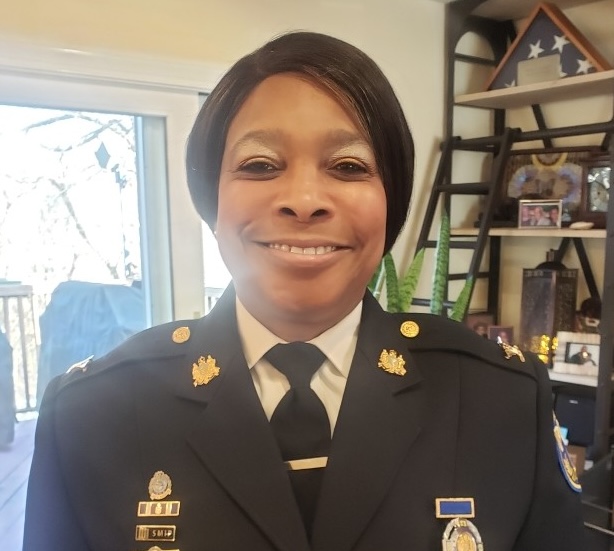Chief Inspector Altovise Love-Craighead
Philadelphia Police Department
Philadelphia, PA

1. Why did you become a police officer?
Obviously, as a person, I wanted to positively contribute to society by giving back to my community, my city, and law enforcement but it was not the typical police story that others may have. I needed a better paying job and I was always intrigued with the idea of being a detective. So, I pursued it along with my oldest sister and two friends. We all took the entrance exam but I was the only one to continue through the hiring process. One of the best decisions I’ve made. I made Detective and decided to continue to advance. I really didn’t find my niche until my brother, Emir Greene, was murdered in Philadelphia in 1997. Based on my own personal experience with his murder; grieving, trying to put my life back together, and encountering the police from a civilian aspect, I was able to take my experience and create a curriculum titled, Trauma-Informed Policing (TIP). Now I share my personal story with other police officers and explain how being trauma-informed provides officers the opportunity to assist victims in a more thoughtful way, refer victims to the appropriate resources, and make law enforcement a better profession. The unique aspect is it also allows us (law enforcement) to see how exposure to violence we encounter in policing impacts our lives, it helps us identify trauma behaviors within ourselves and our fellow officers so that we are able to seek assistance.
2. What motivates you to succeed?
As a proud African-American female, I want young women and girls to see themselves represented in the law enforcement field. When you see people that look like you, it makes a huge difference in how you imagine your life and your future.
3. What’s your most memorable moment on the job?
It was my personal goal to make Chief Inspector. It is the highest civil service rank in the Philadelphia Police Department. I did that in 2020. It’s a very fulfilling feeling to have accomplished it.
4. What challenges have you faced?
As a co-victim of homicide, it is very difficult to see the level of gun violence in my city and in America. For every one person that is murdered there is an entire family and community that feels the impact of that loss. I know how gun violence can change the trajectory of a family and that family’s legacy. In addition to trying to find a work/life balance, I also must pay attention to what activates my trauma related to my brother’s murder to ensure I remain healthy. It’s an ongoing process that will be with me for the rest of my life!
5. What advice do you have for women considering a career in policing?
Policing is a very rewarding profession. Women who are interested in this field should move forward with it, head held high! Once you join a police department, seek advancement, and then help others that join after you.
How we’re changing policing
The 30×30 Initiative is a coalition of police leaders, researchers, and professional organizations committed to advancing and supporting the representation, experiences, and well-being of women at all levels of law enforcement, both in the U.S. and beyond.
Research shows that women play a crucial role in building community trust, de-escalating conflict, and improving public safety outcomes, with evidence linked to reduced use of force and enhanced relationships with the communities they serve. However, women represent less than 14% of sworn officers and 20% of recruits in state and local law enforcement agencies. Additionally, about 40% of the approximately 18,000 law enforcement agencies in the U.S. have no full-time women officers (Source: Bureau of Justice Statistics).
We are collaborating with hundreds of agencies to make law enforcement a profession where qualified women who are drawn to it feel welcomed and supported while ensuring agencies address their unique needs and foster their success.